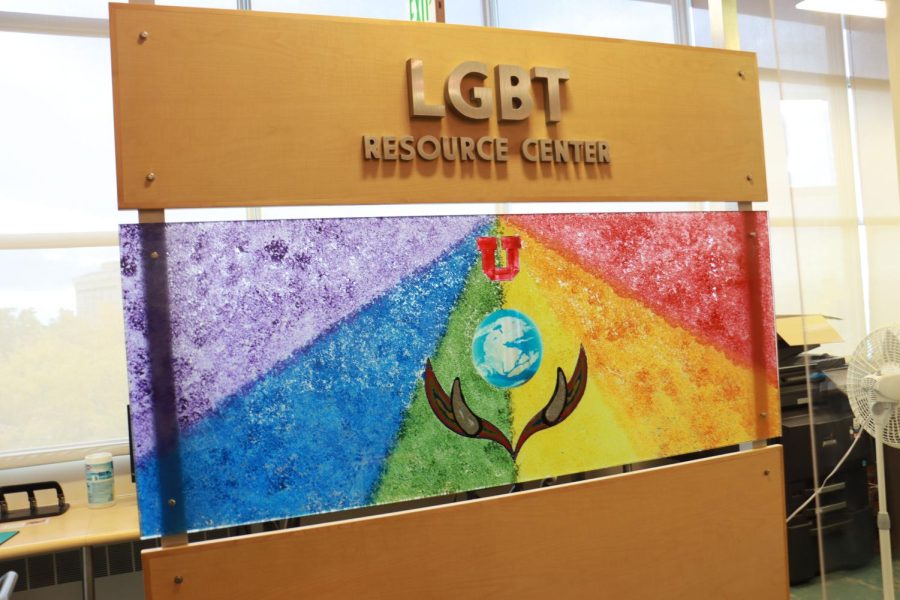
Front sign of the University of Utah LGBT Resource Center in Salt Lake City on Oct. 24, 2022. (Photo by Sarah Karr | The Daily Utah Chronicle)
Cowley & Torres: Stop Normalizing Anti-Trans Violence
January 6, 2023
In the U.S. today, the assault against trans people has never been so large scale. Unfounded transphobic rhetoric creates a moral panic. 2022 is on track to see a record number of anti-trans bills hit legislatures nationwide, with one-third of the bills targeting trans youth. A common rebuttal to holding anti-transness accountable is that such views are nothing more than opinion. Passing off anti-trans rhetoric as mere opinion does nothing but normalize violence towards trans people.
The Rise of Anti-Trans Legislation
In the last couple years, legislation targeting trans individuals has exponentially increased. Utah was one of the first states to ban trans athletes from participating in sports. Out of an entire state of athletes from all disciplines, this law only affected a total of three athletes. While a judge reversed the ruling this past summer, the fact that the law passed at all shows how over-inflated this fear of individuals who do not conform to the societal standard of binary gender really is.
On top of the ban on transgender athletes, Utah is seeking to pass legislation that would further restrict gender affirming care. The proposed bill would prohibit minors diagnosed with gender dysphoria from receiving any sort of gender affirming surgery. These laws aren’t productive; they only serve to further oppress marginalized communities.
Life for queer and trans youth is hard enough as it is. Queer kids are more likely to be bullied in school than their straight counterparts. According to the Utah LGBTQ+ Suicide Prevention Plan 2020-23, in Utah, queer youth are three times more likely to consider suicide. Forty percent of trans adults have attempted suicide at some point in their lives. Adults playing political chess with trans lives pave the path for further violence.
Jesus Wouldn’t Promote Hate Rhetoric
Private religious universities across the country hide behind their religious status to discriminate against trans people. Brigham Young University in Provo is notorious for being one of the worst campuses in the country for queer students. The previous president of BYU, Jeffery Holland, has gone on the record stating that he “would like to hear a little more musket fire in this temple of learning.” This statement was made in regard to “the same sex topic.”
BYU’s transphobia goes far beyond statements made by leadership. In February of 2022, BYU cancelled care for transgender patients at its speech clinic. Six months later, BYU removed its LGBTQ+ materials from welcome baskets for new students. These represent just the most recent instances in a long history of religion-justified oppression of queer students at BYU.
The 2017 Supreme Court Case Masterpiece Cakeshop, Ltd. v. Colorado Civil Rights Commission used religious exemption to justify some shop owners’ homophobic reservations against baking a cake for a same-sex wedding. The implications of this ruling set a foundation to promote discrimination against queer community members. The Gay and Trans Panic Defense for the murder of LGBTQ+ people is still legally viable in several courts of law. This defense is successfully used to reduce sentences for up to a third of defendants. Allowing exemptions on the basis of religion turns a source of community and hope for some into a foundation of hate and fear for queer and trans people.
Deeper than Chromosomes
Transphobic talking points base themselves on a platform of biological essentialism — the idea that gender and sex are inseparable, and that there are only two chromosomal variations. The scientific community recognizes this as false. Studies have also shown that trans peoples’ brains operate more like their desired gender, even from a young age.
At a smaller magnitude, biological essentialism presents itself in ways like inappropriate public fascination with trans people’s genitalia, but it leads to larger consequences like transmedicalism. Pinning transition on a medical diagnosis fails to dissect the role of societally constructed gender identities. Pushing this rhetoric places real lives in danger.
The declaration of trans-exclusive radical feminists such as JK Rowling that trans women are inherently violent and predatory stems from biological essentialism. It incorrectly implies that being born male creates inherent aggression and violence. Its phony cries of co-opting the women’s rights movement ignore that trans-women are murdered at an exorbitantly high rate.
Experts have described violence against trans people as a form of genocide. The intentional extermination of the trans community is witnessed not only in our legislation, but in our religions, institutions and public figures. By allowing this, we mirror our country’s past with the eugenics movement, a time when we had scientific racism explicitly coded into law.
What was previously unthinkably discriminatory is now on the ballot as public figures debate the rights of vulnerable groups for publicity. This threatens the legal basis of the basic human rights of all marginalized people. By building legal precedents of what is considered a legally “valid” body, the foundation for discriminatory legislation grows stronger. Real people are dying and we must do everything in our power to put a stop to damaging discrimination disguised as “beliefs.”
For trans peer crisis support, call the anonymous Trans Lifeline Hotline at 877-565-8860.
For LGBTQ+ crisis counselors, call the anonymous Trevor Project Hotline at 1-866-488-7386, text “START” to 678-678 or visit their website.


